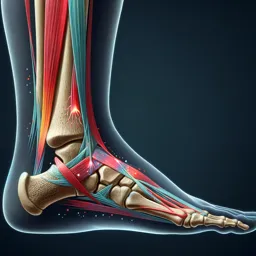Join the free Complete Fundamentals of Physiotherapy course for beginners! Explore 38 pages of content and get a free certification in Health and Physiotherapy.
Course content
Introduction to Physiotherapy
2Human Anatomy
3Human Physiology
4Biochemistry and Biophysics
5Kinesiology and Biomechanics
6Pathophysiology
7Neuroanatomy
8Neurophysiology
9Diagnosis and Physical Examination in Physiotherapy
10Diagnosis and Physical Examination in Physiotherapy: Introduction to Diagnosis and Physical Examination in Physiotherapy
11Diagnosis and Physical Examination in Physiotherapy: Anamnesis in Physiotherapy
12Diagnosis and Physical Examination in Physiotherapy: Examination of the Musculoskeletal System
13Diagnosis and Physical Examination in Physiotherapy: Examination of the Neurological System
14Diagnosis and Physical Examination in Physiotherapy: Examination of the Cardiorespiratory System
15Diagnosis and Physical Examination in Physiotherapy: Vertebral Spine Examination
16Diagnosis and Physical Examination in Physiotherapy: Examination of the Upper and Lower Extremities
17Diagnosis and Physical Examination in Physiotherapy: Assessment of Posture and Gait
18Diagnosis and Physical Examination in Physiotherapy: Pain Assessment
19Diagnosis and Physical Examination in Physiotherapy: Interpretation of Physical Examination Results
20Diagnosis and Physical Examination in Physiotherapy: Preparation of the Physiotherapy Diagnosis
21Fundamentals of Electrotherapy
22Kinesiotherapy
23Respiratory Physiotherapy
24Cardiovascular Physiotherapy
25Neurological Physiotherapy
26Orthopedic and Trauma Physiotherapy
27Physiotherapy in Rheumatology
28Physiotherapy in Geriatrics
29Physiotherapy in Pediatrics
30Physiotherapy in Obstetrics and Urogynecology
31Dermatofunctional Physiotherapy
32Physiotherapy in Oncology
33Intensive Care Physiotherapy
34Physiotherapy in Occupational Health
35Physiotherapy in Public Health
36Sports Physiotherapy
37Physiotherapy Rehabilitation
38Principles of Ethics and Legislation in Physiotherapy
Course Description
Welcome to the Complete Fundamentals of Physiotherapy course for beginners. This dynamic and thorough course is designed to introduce you to the essential concepts and practices within the field of physiotherapy. Comprised of 38 pages of content, it is meticulously structured to provide foundational knowledge and practical skills, suitable for those embarking on their journey in the Health category, specifically within the Physiotherapy subcategory.
The course commences with an Introduction to Physiotherapy, laying the groundwork for understanding the vital role of physiotherapists in healthcare. This initial section sets the stage for deeper dives into the various specialized areas of physiotherapy practice.
Next, you'll explore the intricacies of Human Anatomy, gaining an essential understanding of the body's structural composition, followed by Human Physiology, which delves into the functional aspects of these anatomical structures. This foundational knowledge is critical for any aspiring physiotherapist.
The course continues with Biochemistry and Biophysics, providing insights into the chemical processes and physical principles that underpin bodily functions. This knowledge is pivotal for understanding how movement and physical activity influence health.
Moving on, you'll study Kinesiology and Biomechanics, where you will learn about the mechanics of human movement and how it can be analyzed and optimized to improve patient outcomes.
An understanding of Pathophysiology is also integral to this course, as it links the changes in normal physiological processes due to diseases or injuries, which is fundamental for accurate diagnosis and effective treatment planning.
The detailed segments on Neuroanatomy and Neurophysiology prepare you to understand the nervous system's structure and function, which is essential for diagnosing and treating neurological conditions effectively.
In the comprehensive module on Diagnosis and Physical Examination in Physiotherapy, you'll progress through a series of sub-sections that polish your diagnostic prowess. Starting with an introduction to diagnostic principles, and moving through detailed examinations of the musculoskeletal, neurological, and cardiorespiratory systems, this module ensures you are well-versed in conducting thorough assessments.
This section further includes specialized examinations of the vertebral spine and extremities, and an assessment of posture and gait, ending with pain assessment and the interpretation of physical examination results to prepare a physiotherapy diagnosis.
The course also emphasizes various therapeutic approaches, including Electrotherapy, Kinesiotherapy, Respiratory, and Cardiovascular Physiotherapy. Each of these topics provides core techniques that are instrumental in patient rehabilitation.
Additionally, specialized fields such as Neurological, Orthopedic and Trauma, Rheumatology, Geriatrics, Pediatrics, and Obstetrics and Urogynecology Physiotherapy are covered. This ensures a broad understanding of how physiotherapy adapts to different patient needs.
You'll also explore emerging and specialized domains like Dermatofunctional, Oncology, and Intensive Care Physiotherapy, before delving into Occupational Health, Public Health, and Sports Physiotherapy. These advanced topics prepare you to apply physiotherapy principles in diverse contexts and populations.
To round off your education, the course includes insightful discussions on Physiotherapy Rehabilitation, stressing the importance of ethical practices and an understanding of pertinent legislation in Principles of Ethics and Legislation in Phys
This free course includes:
2 hours and 3 minutes of audio content
Digital certificate of course completion (Free)
Exercises to train your knowledge
100% free, from content to certificate
Ready to get started?
In the app you will also find...
Over 5,000 free courses
Programming, English, Digital Marketing and much more! Learn whatever you want, for free.
Study plan with AI
Our app's Artificial Intelligence can create a study schedule for the course you choose.
From zero to professional success
Improve your resume with our free Certificate and then use our Artificial Intelligence to find your dream job.
You can also use the QR Code or the links below.




























